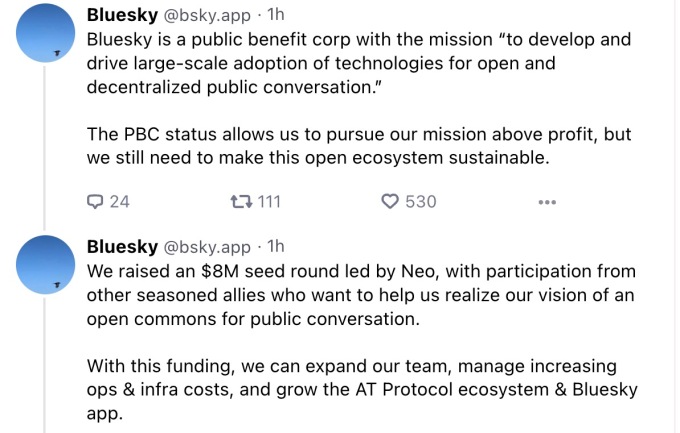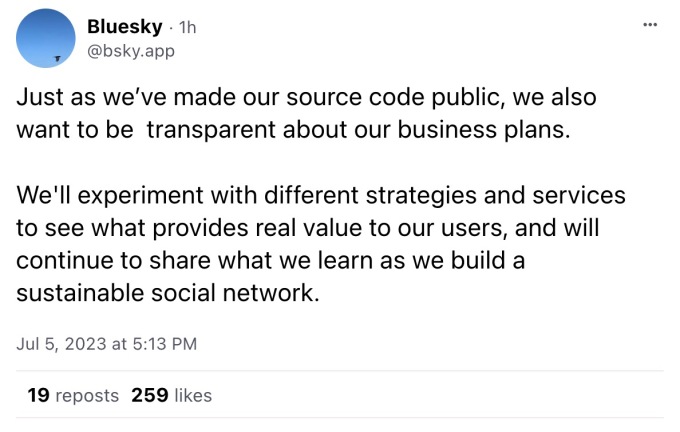Hours before Meta launches its anticipated Instagram competitor, Threads, another Twitter rival — Bluesky — is announcing additional funding and its first paid service. In a blog post on Wednesday, the company shared that it raised seed funds totaling $8 million this summer, when it converted from being a public benefit LLC to a public benefit C Corp. In addition, Bluesky will now offer a paid service that provides custom domains for end users who want to have a unique domain as their handle on the service.
Bluesky’s seed round was led by Neo, a community-led firm with partners like Code.org co-founder Ali Partovi and former Twitter PM Suzanne Xie, the company noted in its announcement. Joining the round were various angel investors, including Joe Beda (co-creator of Kubernetes), Bob Young of Red Hat, Amjad Masad of Replit, Amir Shevat, Heather Meeker, Jeromy Johnson, Automattic, Protocol Labs, Sarah Drasner, Katelyn Donnelly, Ali Evans, Stav Erez, Kris Nóva, Brad Fitzpatrick, Abdul Ly, and others.
The funds will be put to use to expand Bluesky’s team, manage operations and infrastructure costs, as well as grow the AT Protocol powering the Bluesky app.
The decentralized social network protocol Bluesky has been developing is an alternative to ActivityPub — the protocol powering yet another decentralized Twitter rival, Mastodon, and soon, Meta’s Threads app too.
With the funding, Bluesky is also committing to finding a path forward to generate revenue, noting in the blog post that it will be “experimenting with different strategies and services to see what provides real value to our users, and will continue to share what we learn as we build a sustainable social network.”
It clarified that social media companies have traditionally relied on advertising to remain free to end users, but in those cases, “users become the product.” Bluesky’s goal is to find another means to sustain its network, beginning with paid services.
“Bluesky’s business model must be fundamentally different — we are a public social network and our code is all open source, so we have no ‘moat’ when it comes to data,” the announcement states. “We set out to build a protocol where users can own their data and always have the freedom to leave, and this approach means that advertising couldn’t be our dominant business model,” it adds.
The first of Bluesky’s paid services will be custom domains, which are being offered in partnership with the popular domain registrar Namecheap.
Ahead of this, Bluesky had already offered the ability for users to set a custom domain as their handle and so far, over 13,000 of its 100K+ users have done so. However, the current solution requires users to have familiarity with domain registrars and DNS settings. The new paid service will simplify the process, by allowing users to set up a custom domain in minutes, the post explains.
In a separate but related announcement, Bluesky shares more about how the Namecheap paid service will work, by allowing users to pick out a domain name of their choosing and then link it to their Bluesky account. The company didn’t disclose the terms of its partnership with Namecheap, but this would likely be some sort of rev share agreement on the domain name purchases.
Bluesky says in its blog post and in a related series of posts to Bluesky itself that it will explore other services it can bundle for users in the future, but didn’t hint as to what those may be.
The company in recent days has been expanding its feature set and policies, with the introduction of custom feeds, new moderation guidelines, and shared its ideas around moderation and safety for wider public feedback.
These concepts came after the company faced criticism from some members of its community over its approach to decentralization and moderation, which didn’t see it cracking down hard enough on hate speech — a complaint that could drive some users away from the app and toward other solutions, including, possibly, Threads.


Image Credits: bluesky
Bluesky announces its $8M seed round & first paid service, custom domains by Sarah Perez originally published on TechCrunch

